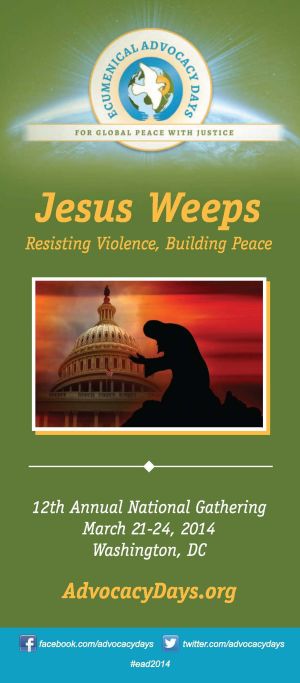EAD 2014 Promotional Resources
The following promotional items can be used and shared to help spread the word about EAD’s 2014 National Gathering and the issues which will be the focus of our educational and lobbying efforts.
EAD 2014 National Gathering Brochure
 Print out copies of the brochure to share with your communities or send copies of the electronic PDF.
Print out copies of the brochure to share with your communities or send copies of the electronic PDF.
“An Ecumenical Call to Just Peace” (World Council of Churches, 2011)
This call is a concerted Christian voice addressed primarily to the worldwide Christian community. Inspired by the example of Jesus of Nazareth, it invites Christians to commit themselves to the Way of Just Peace. Aware that the promise of peace is a core value of all religions, it reaches out to all who seek peace according to their own religious traditions and commitments. The call is received by the Central Committee of the World Council of Churches and commended for study, reflection, collaboration and common action. It is issued in response to a WCC Assembly recommendation in Porto Alegre, Brazil, 2006, and builds on insights gained in the course of the ecumenical “Decade to Overcome Violence, 2001-2010: Churches Seeking Reconciliation
and Peace.”
“Statement on the Way of Just Peace” (World Council of Churches, 10th Assembly, 2013)
Just peace is a journey into God’s purpose for humanity and all creation. It is rooted in the self-understanding of the churches, the hope of spiritual transformation and the call to seek justice and peace for all. It is a journey that invites us all to testify with our lives.
Those who seek a just peace seek the common good. On the way of just peace, different disciplines find common ground, contending worldviews see complementary courses of action, and one faith stands in principled solidarity with another.
Social justice confronts privilege, economic justice confronts wealth, ecological justice confronts consumption, and political justice confronts power itself. Mercy, forgiveness and reconciliation become shared public experiences. The spirit, vocation and process of peace are transformed.
As the Ecumenical Call to Just Peace (ECJP) stated, to take the path of just peace is to enter a collective, dynamic yet grounded process of freeing human beings from fear and want, of overcoming enmity, discrimination and oppression, and of establishing conditions for just relationships that privilege the experience of the most vulnerable and respect the integrity of creation.

